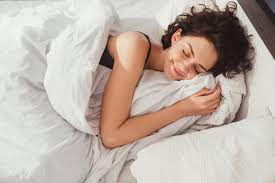Sweating at Night: Apart from a workout, if you do any other strenuous work, the body gets hot and starts sweating, which is common. But, many times people suddenly start sweating while sleeping at night and they get wet. Sweating is a normal part of the body, helping to release heat and maintain optimal body temperature, but regularly waking up at night drenched in excessive sweat is not healthy. There can be many causes for night sweats as the body attempts to maintain its normal temperature, but some triggers may be harmless.
Temperature control and sweating
The hypothalamus, located in the brain, is part of the endocrine system and is the body's temperature control center. It contains temperature sensors that receive information from nerve cells (thermoreceptors) located centrally (in the organs) and peripherally in the skin. Thermoreceptors detect changes in body temperature, sending signals back to the hypothalamus. These signals will either activate sweating to cool the body or shiver to warm the body.

Hormones and Night Sweats
Anyone, regardless of age or gender, can experience night sweats. However, women sweat more at night than men, mainly due to menopause and the associated changing hormone levels. About 80 percent of women experience hot flashes or night sweats after menopause (when menstruation stops for 12 months) and during perimenopause (the time before it). While hot flashes and night sweats both cause a feeling of extreme heat, they are different experiences associated with menopause. Feeling suddenly hot during the day is a momentary phenomenon of heat and may also involve sweating.
Night sweats occur and involve periods of excessive sweating. Changes in estrogen levels are thought to affect the levels of norepinephrine and serotonin, two neurotransmitters that influence temperature regulation, in the hypothalamus. Hormones also affect night sweats in men, especially in men with low testosterone levels, known as hypogonadism. About 38 percent of men age 45 or older have low testosterone levels, but it can affect men at any age.
Infections, diseases, and medications
Our body temperature often increases while fighting infection. It can stimulate sweating to cool the body and reduce body temperature. Night sweats can occur due to minor infections like the common cold. They are also a symptom of serious infections such as human immunodeficiency virus (HIV) and diseases such as Hodgkin and non-Hodgkin lymphoma. However, night sweats are rarely the only symptom.
Medications such as selective serotonin reuptake inhibitors (SSRIs), corticosteroids, thyroid hormone replacement, and methadone can cause night sweats. These drugs affect the parts of the brain and neurotransmitters that control and stimulate sweating. Regular alcohol (especially alcohol dependence) and drug use can also increase the risk of night sweats.
Stress, snoring, and vigorous exercise
People suffering from anxiety usually complain of sweating at night. Psychological stress activates the body's fight or flight system which releases neurotransmitters, causing increased heart rate, respiration, and blood pressure. This causes the body to overheat, at which point the body begins to sweat to cool itself back down. Night sweats can also increase anxiety, leading to more sweating resulting in less sleep and more anxiety. If night sweats are caused by anxiety and it causes discomfort, it is best to get up, move around, and engage in a calming routine, preferably in a dark or dimly lit room.
When to seek help and 5 things to try
There are several health conditions and medications that can cause night sweats and disrupt sleep. If night sweats are regular, bothersome, interfere with sleep, or are accompanied by symptoms such as fatigue or weight loss (not related to lifestyle or diet changes), talk to a doctor to help determine the cause. They may suggest alternative medications to any medications you are taking or recommend tests or investigations.
You can try these solutions:
1. Sleep in a cool room and use a fan if necessary.
2. Do not wear more clothes than necessary while sleeping. Wear breathable cotton or linen pajamas.
3. Choose light bedding. Avoid bedding made of synthetic fibers and flannel.
4. Consider a cooler mattress or pillow and avoid mattress pillows (such as foam ones) that can restrict airflow.
5. Avoid spicy food, caffeine, or alcohol before sleeping.
Photo Credits: Google










